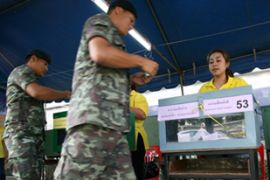Thai parties in coalition talks
Pro-Thaksin party claims enough support to form government after winning most seats.

Continuing instability
The result was seen as a sharp rebuke to the generals who forced Thaksin from power in a 2006 coup.
But it also appeared to be a recipe for continuing political instability.
| In video |
With nearly all the votes counted, the PPP – established after Thaksin’s Thai Rak Thai party was disbanded by court order this year – had won 228 of the 480 seats in the lower house of parliament, according to the state election commission.
The PPP’s closest rivals, the Democrats, took 165 seats, while Chart Thai captured 39.
Complete results were due later on Monday but the PPP could see its tally fall by 10-20 seats as claims of vote buying are investigated by the election commission.
PPP invitation
Samak Sundaravej, the 72-year-old PPP leader, saying he would “certainly be the prime minister”, invited “all political parties to join us in forming a strong government”.
The Democrats conceded defeat but declined to join a PPP coalition government “because we think our ideologies are different”, Abhisit Vejjajiva, the Democrats’ leader, said.
 |
| Samak, the PPP leader and veteran politician, is not known as a conciliatory figure [AFP] |
“If the PPP succeeds in forming the government, the Democrat party is ready to be in the opposition to protect the people’s interest.
“However, if the PPP fails to form a government, the Democrat party is also ready to form a government.”
“So it remains to be seen how the other parties respond to that [PPP] invitation. We’ll wait and see.”
Kuthep Saikrajang, a PPP spokesman, said the party was eyeing Chart Thai and another smaller party as it tried to line up enough seats to form a government.
Chart Thai declined to comment on the overture.
Coup ruled out
Chalit Phukphasuk, the acting chairman for the military-installed Council for National Security (CNS), said on Sunday that the military would not stage a coup if the PPP won, saying there was no reason to.
He said all parties should accept the voices of voters and called on Thais not to see the PPP’s victory as the start of chaos.
Chalit denied reports that the army ordered soldiers to vote for any specific party and also said that once a new government was formed, the role of the CNS would immediately end.
But Pravit Rojanaphruk, a political analyst for The Nation daily, told Al Jazeera that the shadow of military has not been removed from the political arena.
Under pressure
Rojanaphruk said the military and the old aristocratic groups in Bangkok were putting pressure on the smaller political parties not to form a government with the PPP, favouring the Democrats instead.
So a coalition government led by the Democrats could not be ruled out, he said.
 |
| The country remains deeply divided between the rural poor and the Bangkok elites [EPA] |
The PPP got most of its support from the rural north and northeast, where Thaksin’s programmes, including universal healthcare and generous village development funds, were popular.
The Democrats ran strongest in Bangkok, where the 2006 movement to oust Thaksin was centred.
About 60 per cent of 45 million eligible voters cast ballots for about 5,000 candidates.
Thai politics has been in almost constant turmoil since early 2006, when protests mushroomed demanding that Thaksin step down, despite his party’s landslide victory a year earlier giving it an absolute parliamentary majority.
An April 2006 election was boycotted by the opposition and later declared invalid by the courts, leaving Thaksin’s government in limbo until the September 19 coup last year.
